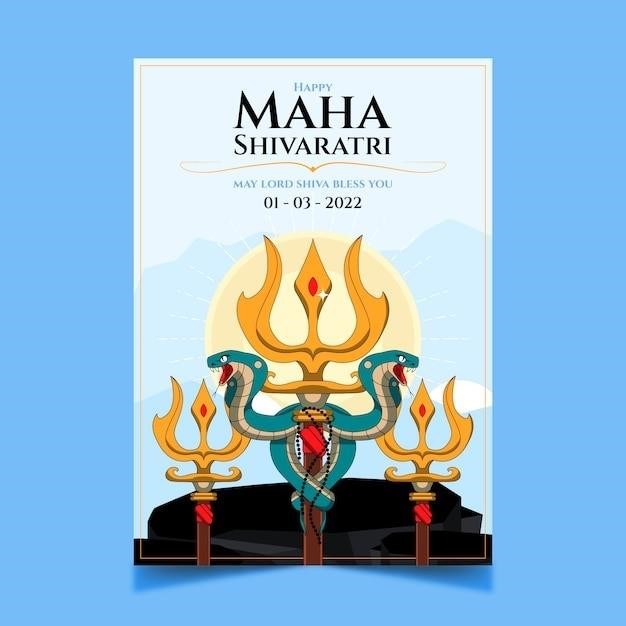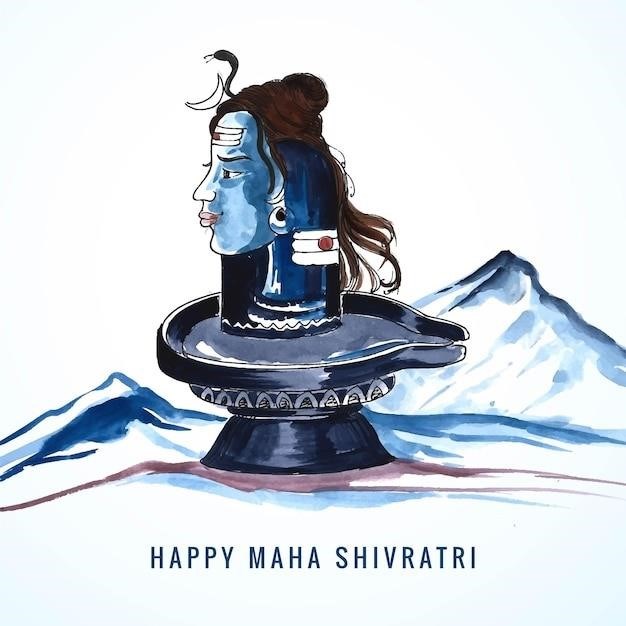
Lord Shiva Ashtothram in Telugu PDF⁚ A Comprehensive Guide
This guide explores the availability of Lord Shiva Ashtothram in Telugu PDF format. Numerous online sources offer downloads, providing access to the 108 names of Lord Shiva. These PDFs facilitate chanting and devotional practices, enriching spiritual experiences for devotees.
Availability of Telugu PDF Downloads
Finding Telugu PDF downloads of the Shiva Ashtothram is relatively straightforward. Many websites dedicated to religious texts and devotional materials offer free downloads. These range from simple text-based PDFs to those with enhanced formatting, including transliteration and sometimes even audio links. Some sites may require registration or a small donation, but many provide free access. The ease of access to these digital versions makes the Ashtothram readily available to a wide audience, transcending geographical limitations and offering convenience to devotees. Remember to check the source’s reliability before downloading to ensure accuracy and authenticity of the text. A quick online search will yield numerous results, allowing you to choose the version that best suits your needs and preferences. This digital accessibility fosters wider dissemination of this revered devotional hymn.
Sources for Downloading the Ashtothram
Several avenues exist for obtaining Telugu PDF versions of the Shiva Ashtothram. Dedicated religious websites often host collections of stotras and prayers, including this important hymn. Many of these sites are specifically focused on providing such resources for devotees, offering a variety of formats and versions. You might also find the Ashtothram within larger compilations of Telugu devotional literature available for download. Additionally, some websites specializing in Telugu language resources or Indian religious texts might include the Ashtothram in their archives. Blogs and forums dedicated to Hinduism or Lord Shiva often share links to downloadable PDFs. It’s important, however, to exercise caution and prioritize reputable sources to ensure the accuracy and authenticity of the downloaded text. Always verify the credibility of the website before downloading any religious material.
Benefits and Significance of Chanting the Ashtothram
Chanting the Shiva Ashtothram, especially in Telugu, is believed to bring numerous spiritual benefits. Devotees often recite the 108 names as a form of prayer and devotion, fostering a deeper connection with Lord Shiva. The repetition of these sacred names is considered a powerful act of bhakti (devotion), purifying the mind and strengthening one’s faith. Many believe chanting the Ashtothram can lead to increased spiritual awareness, inner peace, and a sense of divine grace. It is also thought to help remove obstacles and bring blessings into one’s life. The act of chanting itself can be a meditative practice, promoting calmness and focus. Furthermore, reciting the Ashtothram in Telugu connects the devotee to their cultural heritage and linguistic roots, adding another layer of significance to the practice. The experience is often described as deeply fulfilling and spiritually enriching.

Exploring the 108 Names of Lord Shiva
The Shiva Ashtothram in Telugu presents 108 names, each representing a facet of Lord Shiva’s divine attributes and power. Understanding these names deepens devotion and spiritual understanding.
Understanding the Significance of Each Name
Each of the 108 names within the Shiva Ashtothram holds profound spiritual significance. These names aren’t merely labels; they are keys unlocking deeper understanding of Lord Shiva’s multifaceted nature. For instance, “Maheshwara” signifies the “Great Lord,” highlighting his supreme authority. “Pinaki” refers to him as the wielder of the trident, symbolizing his power to destroy illusion and ignorance. “Shambhu” evokes feelings of auspiciousness and joy, reflecting his benevolent aspect. Studying these names individually reveals a rich tapestry of meaning, enriching the devotional experience beyond mere recitation. The names encapsulate his various roles as creator, preserver, and destroyer, encompassing his benevolent and fearsome aspects. Understanding the nuances of each name allows devotees to connect with the specific attributes of Shiva that resonate most deeply within their hearts. This deeper comprehension transforms the chanting from rote repetition into a meaningful dialogue with the divine.
The Power of Repetition and Devotion
The act of repeatedly chanting the 108 names of Lord Shiva in the Ashtothram is not merely a ritual; it’s a powerful spiritual practice. Repetition, or japa, is a cornerstone of many Hindu traditions, believed to create a focused mental state conducive to spiritual growth. The rhythmic chanting helps calm the mind, clearing away distractions and fostering a deeper connection with the divine. Furthermore, the devotion infused into the chanting amplifies its effects. Each utterance of the sacred names, imbued with sincere faith and reverence, acts as a prayer, a direct communication with Lord Shiva. This focused devotion generates positive energy, promoting inner peace and a sense of connection to something larger than oneself. The cumulative effect of repeated chanting and unwavering devotion can lead to profound spiritual transformation, deepening faith and strengthening the bond with the divine. The power of the Ashtothram lies not just in the words themselves but in the devotion and intent behind their recitation.

Additional Resources and Related Stotras
Explore supplementary resources beyond the Telugu Shiva Ashtothram PDF. Discover other Telugu stotras dedicated to Lord Shiva and similar prayers in various Indian languages. Online resources and audio recitations enhance your devotional practice.
Other Telugu Stotras Dedicated to Lord Shiva
Beyond the Shiva Ashtothram, a rich tapestry of Telugu devotional literature celebrates Lord Shiva. Many stotras, or hymns, offer unique perspectives on his divine attributes and power. These diverse compositions provide varied avenues for spiritual connection and meditation. Some might focus on Shiva’s benevolent aspects, highlighting his role as protector and nurturer. Others may delve into his fierce, transformative nature, emphasizing his capacity for destruction and renewal. The lyrical beauty and profound spiritual insights within these stotras enhance the devotional experience. Exploring these additional resources provides a deeper understanding of the multifaceted nature of Lord Shiva and the depth of Bhakti (devotion) in Telugu tradition. The availability of these texts in digital formats like PDFs further enhances accessibility and convenience for devotees seeking to enrich their spiritual practice. Discover the wealth of devotional literature readily available to expand your connection with the divine.
Similar Stotras in Other Indian Languages
The reverence for Lord Shiva transcends regional boundaries, reflected in the abundance of stotras dedicated to him across various Indian languages. While the Telugu Shiva Ashtothram offers a specific cultural lens, analogous devotional hymns exist in Sanskrit, Tamil, Kannada, Malayalam, and many other languages. These parallel compositions often share common themes, praising Shiva’s attributes and narrating his legendary exploits. However, the nuances of language and cultural context imbue each version with a unique character and poetic flavor. Comparing these different linguistic expressions of devotion reveals the universality of Shiva’s appeal and the rich diversity within Indian spiritual traditions. Accessing these parallel stotras broadens one’s understanding of the multifaceted nature of devotion and the interconnectedness of Indian cultural heritage. Exploring these diverse resources enriches the devotional experience and deepens appreciation for the shared spiritual heritage of India.
Online Resources and Audio Recitations
Beyond downloadable PDFs, the digital realm offers a wealth of resources for engaging with the Shiva Ashtothram. Numerous websites provide access to the text in Telugu script, often accompanied by transliterations and translations into other languages, facilitating understanding for a broader audience. Furthermore, the convenience of online platforms extends to audio recitations. These recordings, often featuring devotional chanting by experienced practitioners, allow for immersive engagement, enhancing the spiritual experience of reciting the 108 names. The availability of both textual and auditory resources caters to diverse learning styles and preferences, making the Shiva Ashtothram accessible to a wider range of devotees. This digital accessibility fosters a global community of practitioners, fostering shared devotion and promoting a deeper understanding of this important Hindu prayer.